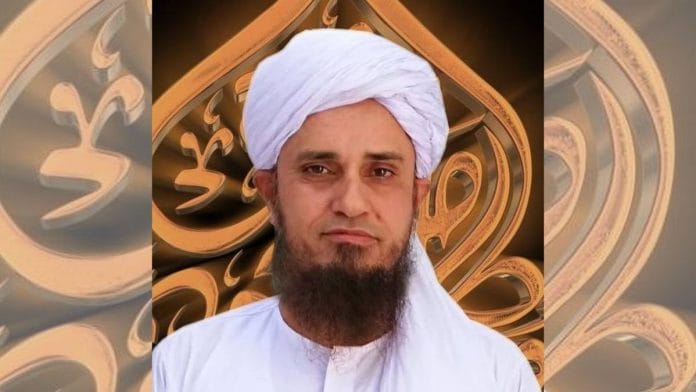New Delhi: In a twist of fate, popular Pakistani cleric Mufti Tariq Masood, a vocal advocate for blasphemy killings, is now at the receiving end of the very “crime” he condemned. Once an advocate for the death penalty for those who insult Islam, Masood’s recent comments—questioning the literacy of Prophet Muhammad and criticizing the Quran—have ignited a firestorm of outrage in Pakistan, forcing him to go into hiding.
Masood’s controversial remarks, which have circulated widely on social media, assert that the Prophet Muhammad “did not know how to read and write” and that he relied on scribes to document the Quran. He claimed, “The Prophet did not write even a single word in it.”
These statements have been met with fierce backlash, particularly from Shia activists in Gilgit-Baltistan, who have called for legal action against him, branding his words as blasphemous.
In his speech, the cleric is seen addressing a gathering of people saying that even though people have different views, they sometimes choose to listen to people because they are scholars but the Prophet lacked any scholarly wisdom.
“We follow the Japanese and listen to their speeches because they are literate…some are PhD scholars, some are scientists but our Prophet did not know how to read or write. He did not write a word by himself but rather called sahafis (writers) like Zaid and others to write it for him and since he did not know how to write, there were grammatical errors and he never noticed them and the errors still exist,” he said.
He added that Iqra Bismil (the name of a chapter or a surah in the Quran), where Allah has advised strict punishment for kufr or disbelief, has semantic errors in the use of letters. Masood called it a ‘grave error.’
Following backlash, the cleric swiftly issued a clarification saying that ‘this was all part of a propaganda campaign against him’ adding that his words have been taken out of context. He said that he did talk about grammatical issues but he was referring to them in the literal sense of how these ideas around the Quran are generally discussed and should not be taken as his opinion.
He then issued multiple apology videos where he does not claim to be wrong but apologises for hurting the sentiments of the people.
Social media was quick to comment. Even actors joined the debate. Actor Hamza Ali Abbasi made a video adding how blasphemy allegations are flexible when it comes to Islamic clerics but stringent for common masses. Shehzad Ghias, in his podcast, The Pakistan Experience, echoed similar thoughts.
Also read: Pakistani cop shoots dead blasphemy suspect in police station, people make him a ‘hero’
Blasphemy laws and the clerics
The irony of Masood’s predicament is stark. His own words have come back to bite him.
He has previously stated that those who apologise for blasphemy should be immediately killed without waiting for a proper trial. Now he is facing the wrath he once endorsed.
His opinions have mostly invited controversy. In 2019, the cleric who claims to be an expert on gender and women issues blamed ‘immodest women’ for Covid-19 pandemic. In another racist opinion, he called Hindus mostly ‘black-skinned’ people.
Masood, a Deobandi scholar (a school of thought in Islam) with a keen interest in gender issues, has built a significant following through his lectures and the provocative themes he explores.
“Newly empowered Islamist political groups have themselves deployed the symbolic weight of Islam, and the blasphemy laws in particular, in order to advance their claims of political leadership. Blasphemy thus, in contrast to general kufr (disbelief), can be committed by either a Muslim or kafir. However it is precisely this ambiguous zone between apostasy and blasphemy which the Deoband have adroitly exploited,” professor Najeeb A. Jan wrote in 2010 in a paper submitted to the University of Michigan.
Mere allegations can lead to dire consequences, particularly for individuals from minority communities. The recent killings of a man in police custody and a doctor shot under questionable circumstances highlight the brutal enforcement of these laws.
The Center for Social Justice, a minority rights organisation based in Lahore, reported that last year, at least 330 individuals were charged in 180 blasphemy cases. A 2021 report on blasphemy killings in Pakistan by the Centre for Research and Security Studies states that 89 people have been killed since 1947 in Pakistan.







Pakistani cleric endorsed blasphemy killings. Then he said the prophet didn’t write Quran… And is now inches from getting a taste of his own medicine.